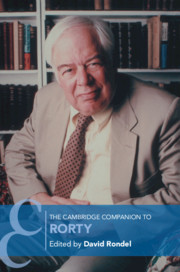Book contents
- The Cambridge Companion to Rorty
- Cambridge Companions to Philosophy
- The Cambridge Companion to Rorty
- Copyright page
- Contents
- Contributors
- Abbreviations of Works by Rorty
- Introduction: The Unity of Richard Rorty’s Philosophy
- 1 Rorty’s Metaphilosophy: A Pluralistic Corridor
- 2 After Metaphysics: Eliminativism and the Protreptic Dilemma
- 3 Rorty and Classical Pragmatism
- 4 A Pragmatism More Ironic Than Pragmatic
- 5 Rorty and Semantic Minimalism
- 6 Returning to the Particular: Morality and the Self after Rorty
- 7 Rorty’s Political Philosophy
- 8 Tinkering with Truth, Tinkering with Difference: Rorty and (Liberal) Feminism
- 9 Rorty’s Insouciant Social Thought
- 10 Rorty and National Pride
- 11 Rorty on Religion
- 12 Rorty: Reading Continental Philosophy
- 13 Rorty’s Literary Culture: Reading, Redemption, and The Heart’s Invisible Furies
- 14 Wild Orchids
- Bibliography
- Index
- Cambridge Companions to Philosophy
1 - Rorty’s Metaphilosophy: A Pluralistic Corridor
Published online by Cambridge University Press: 13 April 2021
- The Cambridge Companion to Rorty
- Cambridge Companions to Philosophy
- The Cambridge Companion to Rorty
- Copyright page
- Contents
- Contributors
- Abbreviations of Works by Rorty
- Introduction: The Unity of Richard Rorty’s Philosophy
- 1 Rorty’s Metaphilosophy: A Pluralistic Corridor
- 2 After Metaphysics: Eliminativism and the Protreptic Dilemma
- 3 Rorty and Classical Pragmatism
- 4 A Pragmatism More Ironic Than Pragmatic
- 5 Rorty and Semantic Minimalism
- 6 Returning to the Particular: Morality and the Self after Rorty
- 7 Rorty’s Political Philosophy
- 8 Tinkering with Truth, Tinkering with Difference: Rorty and (Liberal) Feminism
- 9 Rorty’s Insouciant Social Thought
- 10 Rorty and National Pride
- 11 Rorty on Religion
- 12 Rorty: Reading Continental Philosophy
- 13 Rorty’s Literary Culture: Reading, Redemption, and The Heart’s Invisible Furies
- 14 Wild Orchids
- Bibliography
- Index
- Cambridge Companions to Philosophy
Summary
One of the most remarkable aspects of Richard Rorty’s legacy is the sheer variety of the philosophical imprint from which has thought was formed. His thought not only ranged across Analytic, Continental, and of course Pragmatist philosophy but extended as well into engagements with history, literary criticism, and a wealth of novels. Rorty’s command of such a wide philosophical range is expressive of a kind of metaphilosophical pluralism that was largely missing in his own philosophical milieu and which continues to be sorely needed today. This essay characterizes Rorty’s metaphilosophical pluralism. It begins with an excavation of Rorty’s metaphilosophy in terms of his signature idea of vocabularies. With this in view, it then turns to a neglected source for Rorty’s metaphilosophical pluralism. This source is found in an unexpected branch within philosophical pragmatism, namely that of his onetime teacher, Richard McKeon. Like other pluralisms that preceded his, Rorty’s metaphilosophy will be of enormous value just so long as philosophy remains unsettled about how to account for its disagreements, which is to say just so long as philosophy generates needs for addressing metaphilosophical questions, which is effectively to say just so long as there is such a thing as philosophy.
Keywords
- Type
- Chapter
- Information
- The Cambridge Companion to Rorty , pp. 19 - 41Publisher: Cambridge University PressPrint publication year: 2021
- 1
- Cited by



